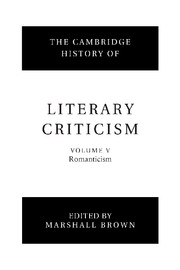Book contents
- Frontmatter
- Introduction
- 1 Classical standards in the period
- 2 Innovation and modernity
- 3 The French Revolution
- 4 Transcendental philosophy and Romantic criticism
- 5 Nature
- 6 Scientific models
- 7 Religion and literature
- 8 Language theory and the art of understanding
- 9 The transformation of rhetoric
- 10 Romantic irony
- 11 Theories of genre
- 12 Theory of the novel
- 13 The impact of Shakespeare
- 14 The vocation of criticism and the crisis of the republic of letters
- 15 Women, gender and literary criticism
- 16 Literary history and historicism
- 17 Literature and the other arts
- Bibliography
- Index
- References
8 - Language theory and the art of understanding
Published online by Cambridge University Press: 28 March 2008
- Frontmatter
- Introduction
- 1 Classical standards in the period
- 2 Innovation and modernity
- 3 The French Revolution
- 4 Transcendental philosophy and Romantic criticism
- 5 Nature
- 6 Scientific models
- 7 Religion and literature
- 8 Language theory and the art of understanding
- 9 The transformation of rhetoric
- 10 Romantic irony
- 11 Theories of genre
- 12 Theory of the novel
- 13 The impact of Shakespeare
- 14 The vocation of criticism and the crisis of the republic of letters
- 15 Women, gender and literary criticism
- 16 Literary history and historicism
- 17 Literature and the other arts
- Bibliography
- Index
- References
Summary
For not even the desire to communicate could be communicated if, before any agreed upon understanding takes place, humans did not already understand each other.
August Wilhelm SchlegelNobody understands himself only by being himself and not also somebody else at the same time.
Friedrich SchlegelPoetics, language, hermeneutics
A persistent concern for problems of language that was shared by most Romantic writers did not come to them as an afterthought. Rather, their novel poetics, which posited the primacy of the creative imagination over an inherited system of rules and conventions, would make them focus on the poetic medium, language itself, and put them on a collision course not only with eighteenth-century neoclassical aesthetics, but also with the linguistic opinions that had been handed down to them by Enlightenment philosophers and theoreticians. Kantian and idealist philosophy on the other hand, whose basic beliefs they shared, though it stressed the creative nature of the human mind and ascribed a formative function to the imagination, did not engender any new philosophy of language. In fact, the rise and flowering of linguistic thought during the seventeenth and eighteenth centuries was so much part of the empiricist and rationalist traditions that in the eyes of the idealists the entire linguistic enterprise had become flawed. Thus the Romantics felt obligated to raise for themselves the fundamental issues of language, that is, its relation to thought, the nature of reality and human creativity, and to articulate linguistic theories that would be relevant to their own endeavours. This was their way of breaking with the rationalist and empiricist traditions and the deeply ingrained representational notion of language upon which neoclassicism had erected its mimetic ideals of literature. It is not surprising, therefore, that Romantic literature not only reveals a new and different conception of language that we can refer to broadly as Romantic, but that the major writers such as the Schlegel brothers, Novalis, Schleiermacher in Germany, Madame de Staël and Benjamin Constant in France and Samuel Taylor Coleridge in England have articulated a coherent conception of language that takes issue with and replaces the traditional seventeenth- and eighteenth-century views associated with the names of Hobbes, Descartes, Locke and Condillac.
- Type
- Chapter
- Information
- The Cambridge History of Literary Criticism , pp. 162 - 184Publisher: Cambridge University PressPrint publication year: 2000

